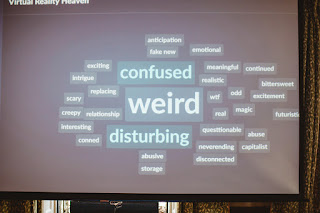Step 2: Try to understand
It's a ridiculous undertaking frankly - trying to understand the science. If you're a practising artist there's a high chance you haven't had much to do with science since you were 16 years old. Caroline & Olly both did spectacularly badly in their GCSE science exams & thought they had hung up their lab-coats for good. Add that to the fact that the people we're collaborating with in Quantum & VR are high-level pioneering scientists at the top of their game! They've sailed through every science exam the national curriculum could throw at them & then they've actively sought out more, bigger, harder questions to solve!
Nevertheless, if we are planning to communicate something about Quantum & VR to the man-&-woman-in-the-street then if feels like we should at least try to grasp a basic understanding.
All the researchers we've worked with so far have been very game in preparing short 'laymen' presentations for us about their own particularly niche subjects. The most helpful ones are the ones that probably seem utterly patronising in a University environment: imagine you are talking to a hungry & distracted primary school child in the last lesson before Sports Day. Researchers, please do not assume anything. Artists, pay attention & do not be afraid to ask.
In spite of the soft voices & the circuitous explanations that expertly avoid jargon & acronyms, we inevitably emerge from the layman's presentations in a fog of confusion & dismay.
Google is a helpful partner at this point. There is no substitute for digging around on the internet for more information on the science in question. Yes, it's true the internet can get it wrong but it does present a truthful rendering of what the world knows. If certain untruths are widely held to be true about Quantum & VR then it's worth us knowing about them - that's likely to be the starting point when we first address the general public!
It's great what you can learn in YouTube - TEDx talks, raving conspiracy theorists, enthusiastic (& clearly flawed) amateurs, guides on How To Build A Quantum Computer (must recommend that one to the researchers). You're not going to be the first beginner trying to catch up on VR & get a grasp on Quantum. You never know writing a blog might even make a useful contribution to somebody behind you.
There's a division here between our two fields of research:
With VR, it feels like we kind of understand the world we're moving in - we immediately have an image of headsets, of sci-fi & immersive worlds. We've seen VR headsets on sale for a tenner in the local supermarket so it can't be that hard to grasp.
Quantum however feels like another world - the immediate imagery that spring to mind is Greek letters in long algebraic equations scrawled frantically across revolving chalk-boards. In fact, Alex, one of the researchers, was casually scribbling algorhythms in a notebook during our first meeting - I don't think it was a reflection on us but we wouldn't know, it was a completely alien language. And so we are creating a Glossary of terms: literally writing down words we don't know & looking them up later.
A: Amplitude
B: Bayesianism.
C: Calculus. Chaos. Cognition. Cosmology. Calculus....

Nevertheless, if we are planning to communicate something about Quantum & VR to the man-&-woman-in-the-street then if feels like we should at least try to grasp a basic understanding.
All the researchers we've worked with so far have been very game in preparing short 'laymen' presentations for us about their own particularly niche subjects. The most helpful ones are the ones that probably seem utterly patronising in a University environment: imagine you are talking to a hungry & distracted primary school child in the last lesson before Sports Day. Researchers, please do not assume anything. Artists, pay attention & do not be afraid to ask.
In spite of the soft voices & the circuitous explanations that expertly avoid jargon & acronyms, we inevitably emerge from the layman's presentations in a fog of confusion & dismay.
Google is a helpful partner at this point. There is no substitute for digging around on the internet for more information on the science in question. Yes, it's true the internet can get it wrong but it does present a truthful rendering of what the world knows. If certain untruths are widely held to be true about Quantum & VR then it's worth us knowing about them - that's likely to be the starting point when we first address the general public!
It's great what you can learn in YouTube - TEDx talks, raving conspiracy theorists, enthusiastic (& clearly flawed) amateurs, guides on How To Build A Quantum Computer (must recommend that one to the researchers). You're not going to be the first beginner trying to catch up on VR & get a grasp on Quantum. You never know writing a blog might even make a useful contribution to somebody behind you.
There's a division here between our two fields of research:
With VR, it feels like we kind of understand the world we're moving in - we immediately have an image of headsets, of sci-fi & immersive worlds. We've seen VR headsets on sale for a tenner in the local supermarket so it can't be that hard to grasp.
Quantum however feels like another world - the immediate imagery that spring to mind is Greek letters in long algebraic equations scrawled frantically across revolving chalk-boards. In fact, Alex, one of the researchers, was casually scribbling algorhythms in a notebook during our first meeting - I don't think it was a reflection on us but we wouldn't know, it was a completely alien language. And so we are creating a Glossary of terms: literally writing down words we don't know & looking them up later.
A: Amplitude
B: Bayesianism.
C: Calculus. Chaos. Cognition. Cosmology. Calculus....


Comments
Post a Comment